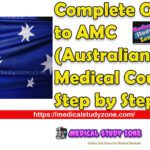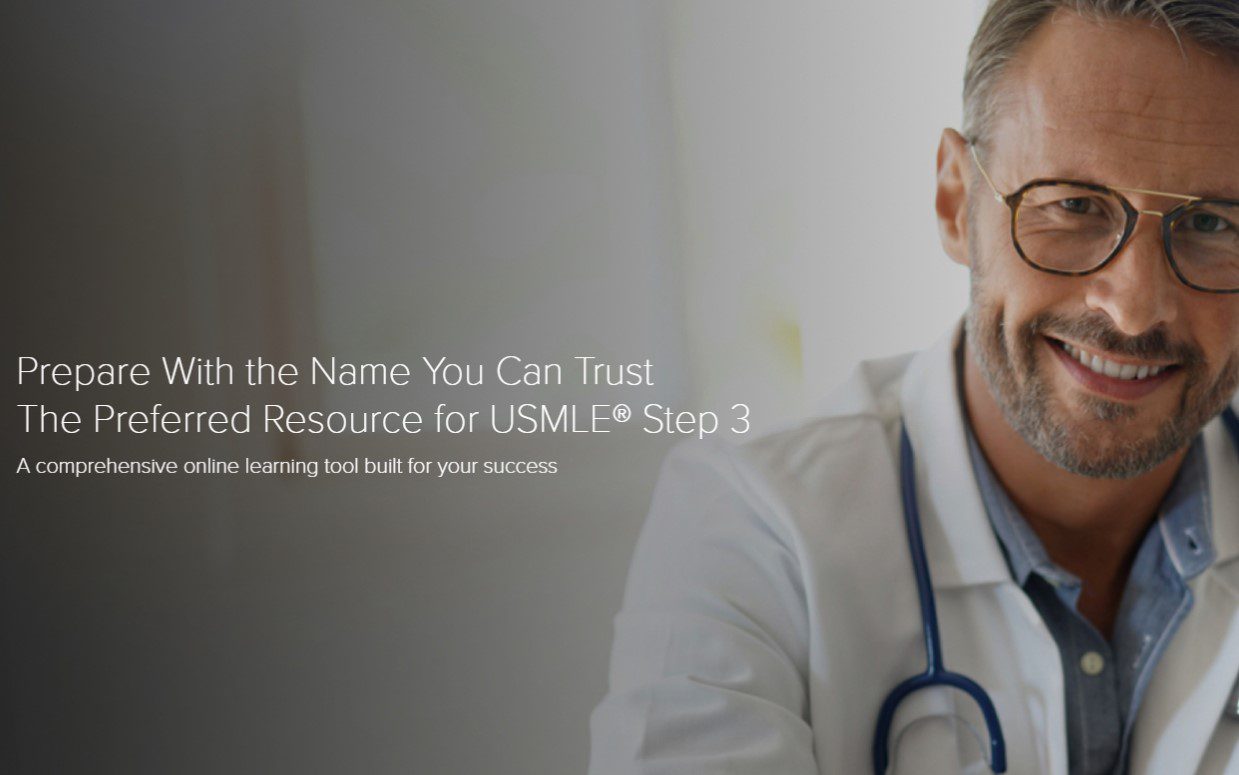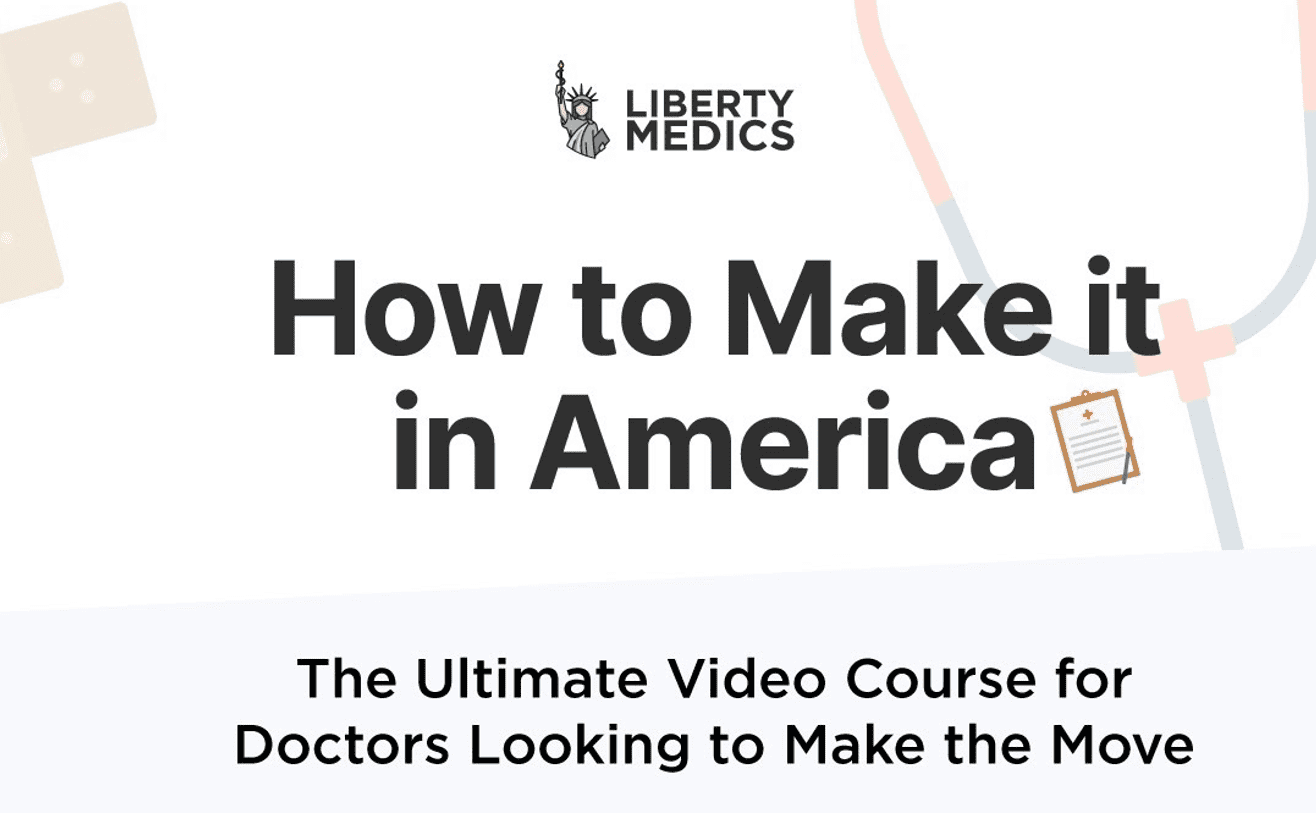Hello Medicos! today we are going to share All About How to become A Doctor In Australia 2023 – The Medical Career Pathway In Australia so must read this whole blog post from A to Z.
Everything You Need To Know About The Medical Career Pathway In Australia
Creating An Online Account:
The journey begins with creating an online AMC candidate account on
https://account.amc.org.au/sign_up Part of the Standard Pathway process, through the AMC, which is the primary source verification of an IMG’s primary qualifications
through the Educational Commission for Foreign Medical Graduates (ECFMG). Before applying for the Standard Pathway, IMGs must apply for primary source verification of their qualifications. IMGs are required to submit medical qualifications directly to ECFMG’s Electronic Portfolio of International Credentials (EPIC) for verification, but also complete an AMC online application to establishan AMC portfolio. You apply to the AMC for authorization to schedule an MCQ examination event, either online or by requesting a paper form. You will be issued with a 12-month authorization to schedule for one MCQ examination event covered in those 12 months. Fees
EPIC ECFMG Account: 125 USD
EPIC ECFMG Primary Source Verification: 90 USD
Establish an AMC portfolio (including 1 x qualification): 504.5 AUD
Add additional qualification/s to your AMC portfolio (fee is payable for
each qualification added): 40 AUD
AMC Part 1 CAT MCQ Examination Authorisation: 2744.48 AUD
AMC Part 2 Clinical Examination Authorisation: 3561.77 AUD
Application Fee for Provisional Registration: 382 AUD
Application Fee for Limited Registration: 764 AUD
Application Fee for General Registration: 764 AUD
Application Fee for Specialist Registration: 764 AUD

Selecting The Pathway:
There are different pathways by which an IMG (International Medical Graduate)
can work as a doctor in Australia. The most relevant pathways to us are:
1) Standard pathway
2) Specialist pathway
3)Competent authority pathway. In brief, specialists can go through either standard or specialist pathways, non- specialists can go through standard pathway and competent authority pathway if
they satisfy the criteria for it, competent authority pathway is if you have workedinan equivalent healthcare system after passing their exams e.g. USMLE, PLAB, etc. Inthe standard pathway, you need to give AMC exams. In specialist and competent
authority pathway you don’t need to give the exams but need to satisfy other
requirements
For Further Information Kindly Refer To:
http://www.amc.org.au/assessment/pathways
Standard Pathway
IMGs who have a primary qualification in medicine and surgery awarded by a
training institution recognized by the AMC are eligible to apply for assessment under
this pathway. The Standard pathway is for IMGs seeking general registration with the Board. This pathway applies to IMGs who are not eligible for the Competent
Authority pathway or the Specialist Pathway. IMGs who have a primary qualification in medicine and surgery awarded by a training institution recognized by both the Australian Medical Council and the World Directory of Medical Schools (WDOMS) can apply for
assessment under this pathway. IMGs applying for the Standard pathway should apply directly to the Australian Medical Council (AMC). IMGs must pass the AMC CAT MCQ Examination before they can apply to the Board for registration. IMGs who have a
primary qualification in medicine and surgery awarded by a training institution recognized by both the Australian Medical Council and the World Directory of Medical
Schools (WDOMS) and who have satisfied all the training and examination
requirements to practice in their field of specialty in their country of training, can apply for assessment under this pathway (specialist recognition or area of need). IMGs applying for the Specialist pathway should apply directly to the relevant
specialist medical college for assessment. For Further Information Kindly Refer To:
https://www.medicalboard.gov.au/Registration/International-Medical-Graduates/Standard-Pathway.aspx
Competent Authority Pathway
The Competent Authority pathway is for overseas-trained non-specialists but is also available to specialists, including general practitioners. This pathway leads to general
registration. IMGs who have passed recognized examinations or have completed training through a Board-approved competent authority can apply for assessment
under this pathway. IMGs applying for the Competent Authority pathway should apply directly to the Medical Board of Australia (the Board) for provisional
registration Competent authority pathway is for people who have worked in
comparable health care systems to Australia. These include the USA, UK, Canada, NZ, and Ireland. You wouldn’t need to give AMC exams through this pathway. Once you have successfully applied through this pathway, you are given provisional
registration which will progress to general registration after one year of working inAustralia. Conditions:
1) Graduates of Medical schools in the United Kingdom with GMC Registrationand1 year of FY1 experience in the United Kingdom or internship experience intheUnited Kingdom or a country approved by the United Kingdom
2)IMGs who passed the PLAB 1 and 2 with GMC Registration, and hold 1 year of
FY1 experience or 1 year of internship experience in the United Kingdomor acountry approved by the United Kingdom
3) Graduates of Medical Schools in Canada or IMGs who completed all parts of the
LMCC and hold 1 year of Residency Training experience in Canada or 1 year of
training experience in a country approved by Canada
4) Graduates of Medical Schools in the United States and IMGs who hold USMLEStep 1, 2CK, 2CS, and 3 or NBME’s 1, 2, and 3 and hold two years of Residency Training Experience in the US
5) Graduates of Medical Schools in New Zealand who have completed the NZ
Registration Examination and hold two runs of the Internship that is approved by
the
MCNZ
6) Graduates of Medical Schools in Ireland who hold Internship experience in
Ireland or a country approved by Ireland and are registered in the Irish Medical
Council For Further Information Kindly Refer To:
2
http://www.medicalboard.gov.au/Registration/International-Medical- Graduates/Com patent-Authority-Pathway.aspx
You might also be interested in:
Harvard Intensive Review of Nephrology 2023 Videos Free Download
Radiopaedia 2023 – Virtual Conference Videos Free Download
AMC – Australian Medical Council Exams | Guide + PDF Books + Recalls Upto 2023 Free Download
Osmosis Basic Science 2023 Videos Free Download
Nursing2023 Drug Handbook 43rd Edition PDF Free Download
Specialist Pathway
This pathway is for overseas trained specialists who have satisfied all the training andexamination requirements to practice in a specialty in another country. This process
includes verification of your qualifications and interviews. It cost around 5000-10000AUD. My general advice to specialists is to pursue this pathway only if you have
Western experience as a specialist or have significant non-Western experience after
the completion of your specialization. People who have just completed their
fellowships recently may be better suited to the standard pathway. There are different
possible outcomes of specialist pathway assessment. It is highly unlikely that you will
be given complete equivalence and thus be allowed to work as a specialist straight
away. Usually, they will accept part of your training and ask you to train further in Australia in the same field and pass the remaining exams. E.g. they may approve two years of FCPS training and ask you to do the remaining two-three years in Australia and pass the exams. The assessment and job finding are two separate processes, you will need to find a job for yourself once your assessment result is given. Some
specialties are easier than others to get into like psychiatry etc. Surgery is almost next
to impossible. For people who wish to pursue the Australian dream but can’t find a job in their specialty, another option is to go through the standard pathway and change their specialty. Concerning IMGs who hold a specialist degree in any field awarded by a body outside Australia wishing to practice that field of Specialty in Australia. This is
for you. Just a clearer demonstration for the IMG flowchart into the Australian Medical
System. Those with registration (Have passed their relevant exams and have had a
one-year experience) in the US / UK / Ireland / Canada / New Zealand can apply
under the competent pathway. Those holding a specialist degree can apply under the specialist pathway. Those under the specialist pathway and competent pathway can get granted AMC Exemption, moreover, those holding a specialist degree may not be required to sit for an internship, their type of registration and pathway will solely
depend on their assessment by the relevant college or fellowship awarding body. IMGs not eligible for the pathway listed above should clear both AMC exams, an English Proficiency Test, and fulfill a 47-week long Internship in AU to get granted full registration. The IMG must apply to the Australian Medical Council (AMC) for
primary source verification of their medical qualifications. Then they should apply
directly to the relevant specialist medical college using the college application form. The college assesses comparability against the criteria for an Australian-trained specialist in the same field of specialty practice. The college will assess the IMG as
not comparable, substantially comparable, or partially comparable. The outcome of a specialist medical college’s assessment of the IMG’s application for the Specialist
pathway will determine the type of registration the IMG may apply for with the
Board. The Board makes the final decision on whether to grant registration. The
Australian Health Practitioner Regulation Agency (AHPRA) is the organization responsible for the registration and accreditation of most health professions across
Australia, including the Medical Board of Australia. Following the assessment, the
IMG may be required to undertake a period of peer review oversight which may
involve completion of
3
workplace-based assessments or a period of supervised practice and further
training which may involve college assessment including examinations. After the
IMG has completed all the college requirements the college can recommend that
the IMG be granted recognition as a specialist in AU and can practice that field of
specialty independently. For Further Information Kindly Refer To:
http://www.amc.org.au/assessment/pathways/specialist
https://www.medicalboard.gov.au/Registration/International-Medical-Graduates/Specialist-Pathway.aspx
Short Term Training in a Medical Specialty Pathway
The short term training in a medical specialty pathway is for IMGs who are overseastrained specialists or specialists-in-training wishing to undertake a short period(usually up to 24 months) of specialist or advanced training in Australia. This
pathway does not lead to registration as a specialist in Australia. IMGs seeking toqualify for specialist registration apply for registration via the specialist pathway – specialist recognition. IMGs who have a primary qualification in medicine and
surgery awarded by a training institution recognized by both the Australian Medical
Council and the World Directory of Medical Schools (WDOMS) and who have
satisfied all the training and examination requirements to practice in their field of
specialty in their country of training or who are no more than two years away fromcompleting their specialist training overseas, can apply for assessment under this
pathway (short term training in a medical specialty pathway). IMGs applying for theShort term training in a medical specialty pathway apply directly to the relevant
specialist medical college for the assessment using a Board application form(AAMC- 30) before applying to the Board for registration. For Further Information Kindly Refer To:
https://www.medicalboard.gov.au/Registration/International-Medical-Graduates/Short-term-training.aspx
AMC MCQ Part 1
The eligibility criteria to appear in the AMC MCQ exam are a primary medical
qualification i.e. MBBS, MD, etc. The AMC CAT MCQ Examination tests knowledge of the principles and practice of medicine in the fields of general practice, internal
medicine, pediatrics, psychiatry, surgery, and obstetrics and gynecology. It focuses
on essential medical knowledge involving the understanding of the disease process;
clinical examination and diagnosis; and investigation, therapy, and management. Work experience is not a requirement. There are many different books you can study to pass the exam but there is no right or wrong answer to which book needs to be
studied. You may read all the books in this world and still fail or you may read just
one book and pass the exam. I believe currently candidates are preferring to study
John Murtagh General Practice book. Along with this you must study the Handbook of Multiple Choice Questions with explanations and try to do the past papers. Some candidates still prefer to do Kaplan USMLE Step 2 lecture notes in place of JohnMurtagh. The advantage of John Murtagh over Kaplan’s notes is that John Murtagh can be studied for the clinical exam also. Practice more and more MCQs. The AMC Computer Adaptive Test (CAT) MCQ Examination is a computer-administered fully4
integrated multi-choice question examination delivered in one 3.5-hour session in examination centers worldwide. The examination consists of 150 A-type MCQs (one correct response from five options). 120 scored items and 30 (non-scored) pilot items. You are expected to complete all 150 items and must complete the 120 scored items. Failure to complete all 120 scored items in the examination may lead to insufficient
information for a reliable determination of your ability and therefore a result on the AMC adaptive scale. The examination result is recorded as ‘Fail —Insufficient data to obtain result’. The AMC MCQ Examination results are processed and issued by the
AMC and not Pearson VUE. The candidate numbers of all candidates who obtained a pass in the MCQ examination event will be published here. The AMC will send the
AMC examination results (AMC Results Letter and candidate feedback sheet) to
candidates by mail to the address recorded on the candidate tracking system. If your
address has changed, please inform the AMC one week before the date allocated to mail out results, by calling the AMC Call Centre at +61 2 6270 7878, or by completing a Notification of Change of Address Form. AMC MCQ results are published
approximately 4 weeks after the examination and will remain for a period of 4 weeks, after which time they will be removed. Countries where you can give the AMC Part 1 MCQ CAT: Australia, Brazil, Canada, China, France, Germany, Greece, Guam, India, Israel, Japan, Korea, Mexico, New Zealand, Northern Mariana Islands, Philippines, Puerto Rico, Singapore, Spain, Thailand, Turkey, UK, US, and US Virgin Islands. You can take the AMC Trial Examination through the link below:
https://trial-exam.amc.org.au/
AMC Clinical Examination Part 2
Once you pass the AMC MCQ exam, you can appear in the AMC Clinical exam. The
AMC Clinical Examination assesses clinical skills in medicine, surgery, obstetrics, gynecology, pediatrics, and psychiatry. It also assesses the ability to communicate
with patients, their families, and other health workers. It is a 16-station
multidisciplinary structured clinical exam that assesses your skills in Medicine, Surgery, Gynecology and Obstetrics, Pediatrics, and Psychiatry. The result is graded as a clear pass, marginal performance, and clear fail. If you are graded as marginal
performance. You should study the Handbook of Clinical Assessment and practice
roleplays more and more. Candidates also study different notes as Karen notes, VMPF notes, etc. I would also advise you to remind yourself of John Murtagh’s
general practice. You should ideally have a 3-4 people study group. AMC Part 2
Clinical Examination contains 14 Stations. Each Station is of 8 minutes, Task
Reading time is 2 minutes and the exam duration is approximately 3 hours and 20minutes. To pass the exam, you need to pass a minimum of 10 out of a total of 14Stations. Where is the AMC Part 2 Clinical Examination held?
AMC Part 2 Clinical Examination is held in Australia and nowhere else. Therefore
to take the exam, you will require to come to Australia by applying to a Visit Visa
unless you live in Australia already. When to book AMC Part 2 Clinical Examination
Depending on your circumstances, the exam can be booked anytime throughout
the year because the exam is held throughout the year multiple times
5
each month. However, due to the high demand, it is unlikely to book next month’s
date. Usually, the available Exam date is almost 45-60 days ahead of the date of
Application/Booking. Because of the high number of bookings, it is wise to apply for
a date as soon as possible if you plan on saving time. While some candidates who
plan not to lose time, apply for the exam immediately after receiving the AMC Part 1
MCQ Result. This allows them to secure a nearby exam date. Those who wait for as
little as days or a week after the AMC Part 1 MCQ result may end up finding a 3
months late exam date. Therefore, it is very important to apply for the exam as soon as possible after getting your AMC MCQ Part 1 Result if you plan on saving time. What should be an ideal time for AMC Part 2 Clinical Examination Preparation An ideal time for exam preparation depends on many factors such as English
Language Skills, Clinical assessment strength, Interpersonal Skills, and Knowledge. For a Doctor who has extensive Clinical Exposure, good communication skills and reasonably moderate knowledge of Medicine can attempt the exam in a period of 2months after passing AMC Part 1 MCQ. Ideally, you require a minimum of 7 Weeks
to prepare for the exam but again may vary from person to person. I would suggest
that a total of 7 Weeks is very safe for exam preparation. Study Material -AMC Handbook of Clinical Assessment -The Oxford American Handbook of Physical Examination. This book is relatively short
and covers like basically everything. -Clinical Cases by Susan Wearne
-100 Cases in Clinical Medicine
-Karren’s Notes
-AMC Part 2 Clinical Examination Recalls
Tips
– After checking that the patient understands what is happening, always ask them about any concerns they may have; don’t just give a lecture. For example, a patient
undergoing herniorrhaphy might be more interested in knowing about painkillers
rather than the details of the procedure. – Avoid medical jargon. If you are doing a clinical attachment, you might get free
patient information leaflets. These leaflets will help you to use layman’s
language when you talk to patients. – Learn four common differential diagnoses of each symptom and ask
questions accordingly. – Some histories have particularly important points. For example, in psychiatry the
assessment of suicidal risk and social history is vital. Similarly, in pediatrics
questions about how the baby feeds, their waterworks, activities, injections, any
significant events during, before, or after delivery, and the health of siblings are
important. – One important thing in the history station is to respond to the patient’s complaints. For example, if he or she has got pain, you could ask the examiner to provide
painkillers, or if the patient has photophobia you might offer to dim the lights in the room. – Another important thing is not to fire questions, there is always enough time. Take things calmly and keep the patient’s comfort in mind. Avoid medical jargon.
6
– Many candidates don’t complete this station and still, pass. The trick is not to panic. Do all the steps properly in the right sequence, and if you miss any, mention it
straight away. – The trend is changing. The initial steps like an introduction, consent, and gloves area lready assumed to have been done when you read the station outside, so sometimes
you may have to start the procedure as soon as you go inside. – Keep in mind safety precautions like throwing the sharps in the sharps bin
and cleaning with antiseptic solutions. – Don’t forget the ABC protocol in every emergency station. – The guidelines in the emergency section of the Oxford American Handbook
of Clinical Medicine or RACGP are sufficient – The most important thing is to be confident on the day. Act like a doctor and not
as a medical student. Everyone gets anxious about the exam and makes mistakes, but make sure you don’t make any major errors. With regular practice, you can easily avoid making major mistakes
– Last but not least. Don’t complicate your preparation. Some people keep on trying to make a perfect plan for each station. Keep things simple. English Language Assessment:
English language assessment is not a requirement to sit in AMC exams but it is a
mandatory requirement of AHPRA before you can be allowed to work in Australia. This registration standard applies to all applicants for initial registration. All internationally qualified applicants for medical registration, or applicants who qualified for medical registration in Australia but did not complete their secondary
education in English, must demonstrate that they have the necessary English
language skills for registration purposes. All applicants must be able to demonstrate English language skills at IELTS academic level 7 or the equivalent and achieve the
required minimum score in each component of the IELTS academic module, OET, or
alternatives specified in the standard. Test results must be obtained within two years
of applying for registration. The Board may grant an extension in specific
circumstances. If you have studied in a specific recognized country, you may be
exempted from the English language assessment otherwise you will need to achieve the required scores on any one of these i.e. IELTS Academic, OET, PTE academic, or
TOEFL iBT. The minimum requirement to get a doctor’s job in Australia is passing AMC MCQ and English language assessment (unless you have successfully applied through specialist or competent authority pathway). Once you have satisfied these
requirements, you need to apply mostly online to vacancies according to the
eligibility criteria. You can also subscribe to be notified of any news. Sometimes, people ask if the internship is mandatory to get a job in Australia. Theoretically
speaking it is not a mandatory requirement, but it is next to impossible to get any jobin Australia if you have not completed a minimum of 12 months internship. You wouldn’t get an internship job in Australia unless you are an Australian graduate. People with very little experience as a doctor overseas are finding it increasingly
difficult to find the first medical job in Australia. My advice to them will be to get
further experience or pursue other options. For Further Information Kindly Refer To:
7
https://www.medicalboard.gov.au/documents/default.aspx?record=WD15%2f16888 &dbid=AP&chksum=Qt6fclXbe4YXYTcrrq%2fUjg%3d%3d
What To Do While Searching For A Job?
This is a very common question. My opinion is while you are waiting to find a job make sure you keep applying on every suitable job you know off. Don’t think just
because you don’t have much experience in that field you have no chance. If you have not passed AMC clinical, prepare for it, and pass it ASAP. Keep your IELTS/OETupdated. Make sure you have certificates for all the time you have worked. Your
registration from the home country must be up to date. You need to make sure there is no uncovered time back home in your own country. If you are in Australia, try to find some sort of health care job. Some courses especially ALS, CPR, etc will always look great on the CV some places require you to have a valid ALS certificate before you start. If you are in Australia, you may think about having a valid Working with children check to help you later on especially it is now required in NS Wand it is free also (you just need to write an NSW address). Many times people do Level 4 nursing certificate which helps you get a job in a nursing home as a care assistant. check www.seek.comand you can find some voluntary work in health care like a nursing home or children camps etc. If you wish to get a GP job, plan for PESCI. Try to find observer-ship, approach every head of a department as well as GP clinics and tell them you are
committed and you may be lucky. Call the IMG friendly hospitals like Wollongong, Royal Perth hospital, Charles Gairdner Hospital, etc, and send your CV to them. Finally, the harder you work the more you will find luck on your side. Help others so God will help you. From A Job Offer to Obtaining the Visa
Once your CV is shortlisted for an interview, as per most locations you just need a CV and cover letter to apply while in other places they require other documents like
AMC result, IELTS/OET result. Some like NT and WA want you to submit your
referee report as well when you apply for the yearly campaigns. But mostly they only check for referees once you have been shortlisted as successful in the interview. Some services ask you to sign a criminal check form at the interview while other services
ask you to do this once you have cleared the interview so they can check your
criminal record. You may also be asked to sign working with children’s check form to have your children check done. You will have to submit 100 points of identification as per commonwealth rules. Your interview can be held face to face, online, or
through a telephone. If you can arrange, face to face may be the best as it shows your
commitment. Once you have given the interview, if they are interested in hiring you they may seek your reference, whereas some facilities get your referee report even before the interview. If they offer you a job, they will apply for a 457 visa nomination for you and your family so make sure you tell them about any dependents with you like a wife(s), children, etc. Usually, a visa is not a big issue as the USA and thus
chances of rejection are very less. Visa will require you to satisfy their criteria like
having health care insurance which you can buy online without any hassle, AHPRA registration, etc. Once you are offered a job, you will need to apply to AHPRA for
registration, one part of the form will be done by your employer while the other is
done by you and thus it is a joint process. You will have to pay for both the 8 registration and visa but your employer will have to nominate you for both. The visa and AHPRA process go side by side, but the visa is not finalized until AHPRAh as
registered you which usually takes more time than other things. Once all criteria are fulfilled along with the AHPRA registration, you are given the visa. Different
documents are required like for AHPRA registration like 100 point identification, registration from the home country, a good standing certificate from the home
country, experience certificates, CV, any criminal history or conduct disorder, etc, PESCI result (for GPs) MBBS degree, etc. Visa also requires almost the same
documents with the addition of health insurance cover which can be bought online. Currently, job vacancies are scare in Australia but still, some fields are favorable like Emergency, GP, Psychiatry, ICU, etc. Flowchart of Australian Medical Career Progression and Pathways Career Pathway: GP: 1 Year of Internship –> Medical Board Registration –>1-2Years of Residency –> 3-4 Years of Registrarship. You will be awarded a Fellowship in GP. Consultant Pathway: 1 Year of Internship –> Medical Board Registration –>1-2Years of Residency –> 4-7 Years of Registrarship. You will be awarded a Fellowship from the designated specialty board. Doctors in Australia and usually divided into Interns, Residents (JMO), Registrar, senior registrar, and consultants. Intern pay is usually from 50000 to 60000$per year before taxes, residents from 60000-80000, registrars 80000 to 110,000, consultants 175000 to 350000. Doctors are allowed about 4 weeks of annual paid leave, one week paid study leave, and about 10 days of sick leave every year. In other
words, the RMO salary is about 33-38$/hr. Salary packaging is also done for doctors
which is a tax-minimization system allowing all hospital employees in Australia to receive up to 30% of their salary tax-free. Mostly hospitals cover you for medical
indemnity otherwise you can buy it yourself as well very cheaply. Hospitals don’t
cover your medical costs, rent, etc. Pays are usually more in Western Australia and Queensland and low in Victoria, NSW, etc. Benefits are also more in these states for
IMGs. Residency is typically a further one or two years following internship spent
working in the hospital or occasionally in community health settings to gain more
clinical experience in a range of settings. In contrast to medical education following the United States system, internship and residency in Australia are considered pre- vocational terms where doctors have yet to commence their training in a specific
specialty. Some specialist medical colleges accept entrants after the successful
completion of an internship or postgraduate year 1 PGY-1. Most prefer applicants to have completed at least a further 1 to 2 years or more of pre-vocational training at
the level of a resident PGY-2 to PGY-3 or more to have gained sufficient additional
clinical experience before applying for a specialist training program. Clinical
rotations and terms are at the preference of the resident and dependent on the
availability of the health service there are no mandatory terms to fulfill, for example, if the resident has aspirations to pursue enrollment in surgical specialty training, they would prefer and request more rotations in the various surgical specialties, for
instance, Neurosurgery, Cardiothoracic, or Urology), vs if the resident had interests
to pursue emergency medicine, he would probably benefit from further
9
rotations in the various critical care specialties that are, Intensive Care Medicine, Emergency Medicine, or Anaesthetics. Residents typically have general registration with the Medical Board of Australia that is having completed an internship in
Australia. While the Medical Board no longer requires performance reports to be
submitted directly to them, it mandates and delegates the responsibility to the relevant
hospital administration, post-graduate medical councils, and specialty colleges
ensuring routine performance reviews and term reports from senior clinicians
supervising their practice. Applications for residency are similar to that of internship and are coordinated by the relevant state government through an annual recruitment
campaign. Applicants have the opportunity to preference the district and/or hospital
they wish to be employed at and are selected on a merit-based system which typically includes a review of the applicant’s resume interview and referee reports. Registrars or”trainee specialists” are doctors formally enrolled in a specialty (also known as
‘vocational’) training. After completing an internship and one or more additional years as a resident and meeting the pre-requisites for the relevant specialty college, doctors
can apply for admission to a recognized medical specialty training program. Registrarship or vocational specialty training is akin to an apprenticeship or clerkship in other professions. It is a period of on the job training and assessments to qualify for
a fellowship of one of the recognized specialist medical colleges, which allows a doctor
to practice medicine independently and unsupervised in that relevant specialty field, and with this access to an unrestricted Medicare provider number and Medical Board specialist registration Selection into a specialty training programs are based upon merit and are highly competitive. Nowadays, most colleges require applicants to have previous clinical supervisors submit referee reports and fulfill some criteria in their
curriculum vitae which typically involve scoring the candidate Applicants with
satisfactory CV are invited to interviews or assessments that typically assess adequate medical knowledge to commence specialty training and explore psychosocially if the candidate is suitable for the specialty. The vast majority of the colleges require the
applicant to hold an AU or NZ citizenship or be a PR holder. However some colleges
don’t and they are the following: Colleges of Radiology, Psychiatry, Pathology, Emergency Medicine, Physicians (I guess this is the biggest college dealing with almost half of the specialties), and Rural & Remote Medicine under the RVTS pathway. All colleges require the applicant to hold two years of PG training as well as some
specific requirements which may differ from one college to another. However, the
College of Physicians and the College of Psychiatrists only require one year of PG experience before admission which is the only exception. Registrars pay an annual
enrollment fee to be part of the specialty college (in addition to fees for exams and courses). To qualify for election to fellowship and specialist recognition, most
specialist colleges have clinical, practical, and exit exams, in conjunction with other
assessments to assess the full range of skills and behaviors required as a doctor. Specialist training programs and examinations are administered by the individual
colleges and vary between three and seven full-time years to complete, depending
upon the specialty you choose. Part-time training is available to most specialties, and dual specialty training is optional and streamlined for some specialties. Vocational
training for most medical specialties is undertaken in a public teaching hospital
however it includes rotations in private hospitals, regional, rural, and community
health settings. The exception is
10
general practice, where doctors undertake most of their training in designated
private general practices in a community setting. Registrars are employed and
remunerated by the hospital at which they work for and thus are still required to
apply for a position through the recruitment campaigns coordinated by the relevant
State government’s ministry of health
Fellowship and their vocational training program duration after 1-2 years of residency Emergency Medicine: 5 Years
Dermatology: 4 Years
Sports and Exercise Medicine: 4 Years
Anesthesiology: 5 Years
Rural and Remote Medicine: 4 Years
ICU Medicine: 6 Years
Oral and Dental Medicine and Maxillofacial Surgery: 5 Years
Surgery: 5-7 Years
Medical Administration: 3 Years
Internal Medicine and Specialties Ex: Cardio-Respiratory Nephro Rheumatology exact:
4-6 Years
Obstetrics and Gynecology: 6 Years
Ophthalmology: 6 Years
Psychiatry: 5 Years
Radiology: 5 Years
General Practice: 3 Years
Pathology: 5 Years
How To Become A GP Specialist in Australia
I have been asked to give info about the specializing in GP for IMGs. This is one topic in which most people are well versed and are considered the easiest pathway. Recently it’s becoming increasingly difficult for IMGs to get the first GP jobs. AHPRA has also been more cautious in registering new doctors. As per the latest registration guidelines, IMGs applying for, or renewing, limited registration for area of need to work in a
general practice position for the first time in Australia, are required to have at least
three years (full-time equivalent) experience working in general practice or primary care. The requirement for experience will not apply to IMGs renewing registration to continue working in a current general practice position. You need to secure a job in the DWS area and then apply to AHPRA. You need to have 3 years of GP experience to be considered for registration. RACGP Overseas GP assessment is recommended but not
mandatory. GPS is funded federally so we have to comply with certain Medicare rules. As an IMG you are restricted by generally two restrictions. One is 19AB that you have to work in District of workforce shortage (DWS) and if you’re a permanent resident or
citizen you need to get 19AA exemption which needs you to need to be in a 3GAtraining program which is a bit more competitive and as an IMG it generally means
going rurally. There are three pathways to GP fellowship (GP is a specialist job in Australia). One is an independent pathway and the other is through a training
program and third is ACRRM which is also another 3GA (very competitive). The
Independent pathway requires 4-year work as a GP as assessed by RACGP out of
which one year needs to be in Australia. You don’t need to have general registration11
to sit for the exams. IMGs who have PR and citizenship can’t go through this pathway. This pathway is least supported and mostly you’ve to work and study by yourself. RACGP is making some study modules for this pathway but its early stages for that. 3GA program pathway is where PR and citizens can apply. Most of IMGs end up in this pathway as most Aussies don’t want to work in a rural area. This training
program is for 3 years and you work as a registrar in general practice. You get weekly teaching and regular visits by RTO to check your performance. The exam for both pathways is similar. First is the AKT exam which is like MCQs and then is the
dreaded KFP which has Pass Rate of 50-55% and IMGs have even lower pass rate. Once you pass that then is OSCE and if you pass all of them when you apply for a
fellowship and then to Medicare. Once you become a fellow, 19AA restriction doesn’t
impose on you. You can work in any region. The third is through the ACRRM pathway which is highly competitive as they’ve limited seats expect a lot of skills
beforehand to consider you. The exams are generally similar but it helps you in be coming an excellent clinician in rural areas where you’ve got very limited support. In the end, just my two cent about another issue, I have many IMGs saying they can’t
go to the rural area due to family commitments even if your spouse/partner is
working a white-collar job and has to leave it to go with you, still, you should consider
it because GPS positions are very financially secure and will be able to bear the
financial burden till you complete your fellowship. Moreover, it’s truly amazing
working in the world’s 2nd best health system and even if it requires going to the
rural area to start your career here, you should seriously consider it. PESCI
IMGs applying for registration may be required to undergo a pre-employment
structured clinical interview (PESCI) depending on the nature of the position and the level of risk inherent to the position. The purpose of a PESCI is to establish whether
an IMG has the knowledge, skills, and experience to practice safely and effectively in the specific position for which registration is being sought. PESCI stands for a pre-employment structured clinical interview. IMGs who doesn’t
have general registration with AHPRA need to pass this interview-based exam to
work as a GP in Australia. It may also be required in some hospital-based jobs. AMC accredited providers are Australian college of rural and remote medicine, Health work force assessment Victoria, PMCV, Queensland Health, and RACGP. It costs
around 700-1000$. Usually, people study John Murtagh’s general practice and past
papers for this exam. For Further Information Kindly Refer To:
http://www.medicalboard.gov.au/Registration/International-Medical-Graduates/pesci. aspx
Covering The Gap
The recency of practice with a minimal gap is very important in securing a job in Australia. CPD (continuing professional development) activities help in reducing the gap. These include attending workshops, training courses, etc. They are also
available on the RACGP website. To ensure that they can practice competently and safely, medical practitioners must have recent practice in the fields in which they
intend to work during the period of registration for which they are applying. To meet
the
12
standard, they must have practiced within their scope of practice for a minimum total of: – Four weeks full-time equivalent in one year, which is a total of 152 hours, or
– 12 weeks full-time equivalent over three consecutive years, which is a total of 456hours. If a practitioner has been absent from practice, the specific requirements depend on the field of practice, their level of experience, and the length of absence fromthe field. If a practitioner proposes to change their field of practice, the Board will consider
whether the practitioner’s peers would view the change as a normal extension or
variation within a field of practice, or a change that would require specific training and demonstration of competence. Practitioners who are unable to meet the recency of
practice requirements set out in the standard may need to complete professional
development activities, submit a plan for re-entry to practice or other training or
assessments. They may also be required to work under supervision or oversight, before being granted unrestricted registration. All registered medical practitioners (excludes
practitioners with non-practicing registration) are required to participate regularly in continuing professional development (CPD) that is relevant to their scope of practice. This involves maintaining, developing, updating, and enhancing their knowledge, skills, and performance to ensure they deliver appropriate and safe care. The CPD requirements that medical practitioners must comply with will depend on the type of
registration that they hold and on the stage of their career. For example, medical
practitioners who are on the specialist register are expected to comply with the CPD requirements of their specialist college. Interns and prevocational trainees are
expected to participate in the supervised training and education programs associated with their position. All medical practitioners will be required to make a declaration that they have met the standard and have completed the necessary CPD when they
apply for renewal of registration. The Board requires medical practitioners to keep records that may be subject to audit. The standard covers the CPD obligations for
medical practitioners in a range of circumstances. For Further Information Kindly Refer To:
https://www.medicalboard.gov.au/documents/default.aspx?record=WD16%2f19473 &dbid=AP&chksum=r3KA%2fZ0ECm3jZ1M7CfEMSw%3d%3d
https://www.medicalboard.gov.au/documents/default.aspx?record=WD16%2f19475 &dbid=AP&chksum=c1dO2mg590igBem%2fsQqO6w%3d%3d
Observer-ship
Observer-ship refers to observing a medical practitioner to do his usual activities. It’s away to understand how the Australian system works. You can be an observer in a GP clinic or a hospital. For hospitals, you need to go to the head of the department and tell him of your desire to be an observer. For a GP clinic, you can go to the individual
GP or head of the practice. Period of provisional registration
Up to 12 months provisional registration can be granted by the Board. The National
Law states that provisional registration may not be renewed more than two times. After two renewals, if you still require provisional registration to complete
supervised
13
practice, you must make a new application for provisional registration. You must
not practice without registration. Types of AHPRA Medical Registrations
There are three major types of AHPRA registrations i.e. limited, provisional, and general. All these registrations require a job offer. If you have just passed AMCMCQ, you are eligible for limited registration. Provisional is for people who have passed AMC clinical but not yet worked in Australia for at least one year. You get general
registration once you have passed AMC clinical and worked at least one year in Australia. You will need general registration to be eligible to enroll in a specialist
training program. Training programs range from 4-7 years depending upon the
specialty you are undertaking. Certain specialties are relatively easier to get into like psychiatry, and Emergency, etc. while others like Surgery are next to impossible. Under the Health Practitioner Regulation National Law, as in force in each state and territory, there is a range of registration categories under which a doctor can practice medicine in Australia. Different categories apply to different types of registration. 1) Limited Registration
Limited registration is available to medical practitioners whose medical
qualifications are from a medical school outside of Australia or New Zealand. These medical schools must be listed in both the current online versions of the Australian Medical Council recognized medical schools and the World Directory of Medical
Schools. Applicants must be able to demonstrate that they have completed a medical
curriculum, leading to an entitlement to registration in the country issuing the
degree to practice clinical medicine. There are four types of limited registration, granted for different purposes, which allow internationally-qualified medical
practitioners to provide medical services under supervision. Applicants who are
eligible for the competent authority pathway or who hold the AMC Certificate apply for provisional registration (they are not eligible to apply for limited registration). – Postgraduate training or supervised practice
– Area of Need
– Public interest – Teaching or research
2) Provisional Registration
Provisional registration applies to people who are qualified for general
registration and who are also required to complete a period of approved supervised practice in Australia before becoming eligible for general registration. For AU and NZ Graduates who are undertaking their internship in AU
For AU and NZ Graduates who completed their internship in another
country For IMGs in the Competent Pathway
For IMGs in Standard Pathway holding an AMC Certificate
3) General Registration
For AU and NZ
Graduates
For IMGs in the Competent Pathway
For IMGs in the Standard Pathway holding an AMC Certificate
4) Specialist Registration
Specialist registration is available to medical practitioners who have been assessed by an AMC accredited specialist college as being eligible for the fellowship. A fellowship
14
is not a pre-requisite for specialist registration. The Ministerial Council has approved a list of specialties, fields of specialty practice, and specialist titles. Medical
practitioners with the necessary qualifications in the approved specialties will be
included on the Specialist Register and their specialist title will be protected by law. The AMC MCQ Part 1 is recognized in the Republic of Ireland and New Zealand too, in addition to, of course, Australia. So doctors who managed to clear the AMCMCQ Part 1 are eligible to take the PRES 3 or NZREX examination in the Republic of
Ireland and New Zealand respectively. Graduates who completed their internships in Australia, New Zealand, Pakistan, Sudan, South Africa, and Malaysia are exempt
from the PRES 3 examination and can apply for registration with the Irish Medical
Council directly. Those who completed their Internship in Pakistan. A certificate of
experience issued by the PMDC is required. For Further Information Kindly Refer To:
https://www.medicalcouncil.ie/Registration/Registration-Rules-and-Exemptions/Registration-Rules-and-Exemptions.html
FAQ
Q: Do you need to clear the IELTS or OET to sit for the AMC MCQ Part 1?
A: No. Q: Do you need to clear the IELTS or OET to apply for an internship and a work visa? A: Yes, you do. Q: How high should you score in your English Proficiency Exam?
A:An overall band score of 7.0. with a minimum of 7.0 in each component for one
time applicants. In case you sat for the exam twice in a period of 6 months, then a
minimum of 7.0 in the Speaking and Listening components and a minimum of 6.5inthe writing and reading components are accepted. As for the OET, an overall score of
B and minimum of score B in all four components is required, in case you sat for it
twice in a period of 6 months, then an overall score of B with a minimum score of C in any component is accepted. As for the PTE, an overall score of 65 and a minimum of 65 in all components is all that is required. Q: Do you need to clear the AMC Clinical Exam Part 2 to apply for an internship?
A: No, you don’t. You’ll have to clear it during the internship year to apply for the full
registration. It’s recommended to clear it before applying for an Internship, which will enhance your CV. Q: How long is the post-graduate training in Australia?
A: You’ll need to overtake an internship year under supervision for 1 year, then apply for a pre-vocational training residency post for 1-2 years, then a registrarship post- AKA Vocational Training which would take from 3-6 years. If you do the math, that’s
between 5-9 Years. 5 years for a fellowship in General Practice / Sexual Health /
Addiction Medicine – Up to 9 years for a fellowship in Ophthalmology / OB-GYN/
Surgery / ICU /. Other specialties range in between those, taking logically 6-8 years
in total. Strictly speaking, I’m not taking the paperwork delay or other
inconveniences into account.








please make one for America